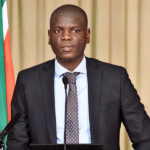In a significant political development, Thomas Sipalo, who was serving as the National Youth Chairman of the United Kwacha Alliance (UKA), has announced his resignation from both his position and the party. This decision comes amid what Sipalo describes as an alarming shift in the alliance’s priorities and vision, leading to increasing disillusionment among its members.
In a letter addressed to UKA Chairperson Sakwiba Sikota, Sipalo explained that the current direction of the alliance no longer aligns with his principles. He cited growing ambiguity in the party’s objectives and indecisiveness among its leadership as key reasons for stepping down. According to Sipalo, these issues have fostered an environment where personal gain and internal power struggles take precedence over the collective mission of serving the public.
“The prioritization of personal agendas has fractured our unity and undermined our ability to pursue collective goals,” Sipalo wrote. He pointed out that the alliance’s inability to resolve key issues has diminished public trust, further eroding its credibility.
Challenges of Accountability and Integrity
One of Sipalo’s most pressing grievances was the perceived lack of consistent accountability within the leadership. He stated that while some leaders are shielded from scrutiny, others face disproportionate consequences. This inconsistency, Sipalo argued, has contributed to a culture of favoritism and inefficiency.
“Greed and individualism have weakened our foundation,” he said. “The absence of collective progress has stymied efforts to deliver meaningful change, making it impossible for me to remain part of an organization that has strayed so far from its foundational purpose.”
Prioritizing Integrity and Public Service
Sipalo emphasized that his decision to leave UKA was driven by a deep commitment to integrity and public service. He believes that stepping down is necessary to remain true to his values and prioritize the greater public good over partisan interests.
“My conscience compels me to stand firm in my principles, even if it means stepping down from this position,” Sipalo asserted. He also committed to assisting in a smooth transition by completing any outstanding tasks.
Future Outlook
Sipalo’s resignation is expected to send ripples through the alliance, which has been facing criticism for its perceived lack of strategic direction and unity. Political observers believe that his departure may prompt further introspection within the UKA, raising questions about its long-term viability and cohesion.
In his closing remarks, Sipalo expressed his gratitude for the opportunity to serve and extended his hopes that UKA can realign with its core mission. He underscored the importance of leadership that prioritizes collective progress over personal interests, a vision that he feels has been lost in the current structure.
While Sipalo’s next steps remain uncertain, his resignation highlights the internal struggles facing political alliances striving for relevance and effectiveness in Zambia’s political landscape.






